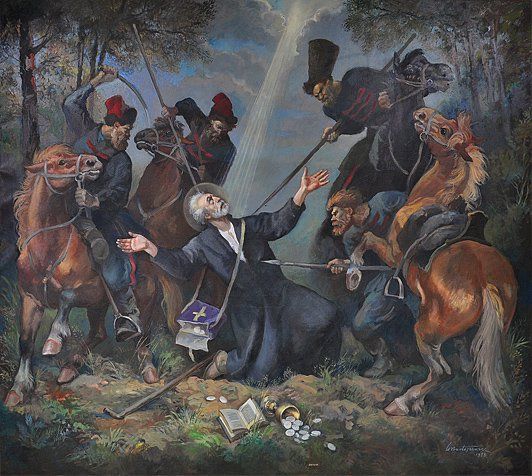He was quick-tempered, stubborn and uncompromising. An outstanding preacher who spoke about faith when others were fearful. Years later, the Vatican recognized that in the history of the Church “there had not been a second such cruel case of martyrdom.”.
by Jan Hlebowicz
Although the Chmielnicki Uprising had ended three years earlier, the Zaporozhian Cossacks were still prowling Polesie, stretching – as Józef Ignacy Kraszewski wrote, “from Rus and Volhynia, towards Prussia, Mazovia and Lithuania.” Someone had revealed to these Cossacks that the Jesuit Andrzej Bobola,a famous missionary, preacher, and “hunter of Orthodox souls,” was hiding on the Peredylo estate. The clergyman was warned [that he had been exposed]. So he left the village in a hurry, hiding in a wagon. On the way to Janów he fell into an ambush. The Cossacks surrounded the Jesuit and, under the threat of death, demanded his conversion to the Orthodox faith. “I am a Catholic priest. I was born in this faith and I also want to die in it,” replied Bobola. The Cossacks smashed him with a whip, knocked out his teeth, and then tore his nails and the skin off his hands. They dragged him with horses to the wooden shed where the slaughterhouse was located. There they stuck splinters under the priest’s fingernails, burned the splinters with fire, cut out a chasuble on the body, and “sprinkled [the] fresh wounds with scattered chaff.” Then they deprived the priest of his nose and lips and through an opening in the neck “brought out the tongue and cut it off at the base.” Eventually they hanged their victim upside down, and, as the body twitched in pre-mortem convulsions, laughed that the “Pole is dancing.” Finally the commander killed Bobola with his saber. “Bobola’s body was lying on the table, I saw the wounds covering it from the neck to the hips, the face was swollen from the blows, so that neither the eyes, nor the nose, nor the ears could be recognized,” testified the Janów surgeon, Dominik Wolff Abrahamowicz. “The soul shudders at the memory of all the torments that this hero of Christ suffered with steadfast bravery and unbending faith,” wrote Pius XII years later in the encyclical “Invicti Athletae Christi” that was dedicated to this martyr from Poland.
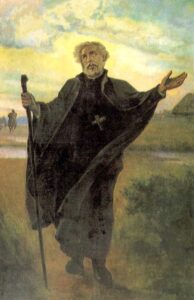
Saint Andrew Bobola
Prone to outbursts of impatience
The future saint was born on 30 November 1591 in Strachocina, a small village in Podkarpacie near Sanok. After graduating from school in Braniewo, Andrzej entered the Jesuit novitiate in Vilnius, where he first studied philosophy for three years, and then studied theology for four more. Between these two stages of study, he completed a pastoral apprenticeship. In the Jesuit order, he initially caused quite a lot of trouble for his brothers. His superiors described him as choleric and “prone to anger, stubbornness and outbursts of impatience,” who showed “too little control of the tongue.” In 1628, the Provost Nowacki even decided that if Bobola did not temper his “inflammatory, [and] explosive character,” he would not be allowed to teach at the school. According to the Jesuit biographer, Jan Popłatek, Bobola’s impetuosity constituted “his cross, which weighed down on him and constantly accompanied him until his death.” The future saint, however, was to take the attention of his confreres to heart and began to work tirelessly on his character, showing “tireless energy and a kind of stubbornness.” “He fought and struggled with himself to root out his faults, and to gain and strengthen his virtues,” wrote Popłatek.
Soulhunter among forests, rivers and swamps
“He was of medium height, with a compact, muscular and strong body. His face was round, full, his cheeks flushed with a pale, gray hairstyle, his bald spot slightly shining through. The graying, low-trimmed beard added seriousness to the face,” recalled Jan Łukaszewicz, who knew Bobola personally. During his 46 years in the Jesuit order, the future martyr lived in many places, and was sent to wherever there was a need. During the plague in Vilnius, he devotedly helped the sick and “he supplied them with holy sacraments and administered medicines to them at the risk of his own life.” He worked as a confessor, teacher, and church rector. He also gained publicity as an excellent orator. “In Vilnius, as well as in Brunsberg [Braniewo in Warmia], Pułtusk, Nesvizh, Bobruisk, Płock, Warsaw and Łomża. He probably also stayed in Gdańsk, taught in schools, headed the Marian Sodality, listened to confessions, and above all, he became famous as a preacher with a compelling voice,” noted Bobola’s biographers, Henryk Szuman and Jan Cyrankowski in 1938.
He was in his sixties when he came to Pinsk in Polesie, in what is now Belarus. “Bobola organized missionary trips to the area stretching between Pinsk and Janów Poleski. He went around towns and villages, giving sermons to larger groups of people, and above all, he went to rural huts to talk to the people about the faith,” according to Józef Niżnik in his description of the pastoral activity of this Jesuit. The villages were located at great distances from each other, scattered among forests, rivers and swamps and there were no roads. The emaciated “apostle of the Pinsk region” (he usually lived on water and bread) wandered from settlement to settlement, telling people about Jesus, conducting baptisms, celebrating weddings, masses, and taking confessions. He visited both those who professed to be Catholic and those who considered themselves Orthodox. People started to call him the “soul-hunter,” that is, the hunter of souls. The missionary activity of Bobola astonished the Cossacks, who considered themselves defenders of the ousted Orthodoxy, and they then sentenced the Jesuit.
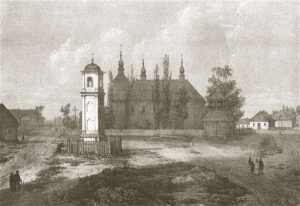
Andrzej Bobola memorial church in Janów Poleski, 19th-century image by Napoleon Orda
First there was a dream, and then there was a cult
The parish priest of Janów Poleski, Jan Zaleski placed the bloodied body in a wooden coffin in the church. It was the beginning of a local cult, but it quickly disappeared. Then the body was transported to Pinsk and buried in the local Jesuit college. His chronicler noted: “Andrzej Bobola in 1657, slaughtered in Janów, martyred in the cruelest way, laid before the great altar.” The Cossack wars, the murder of many Jesuits and further unrest in the country were not conducive to the beatification process. Bobola was forgotten for several dozen years. But this all changed following an unusual dream. On Sunday, 16 April 1702, the rector of the Jesuit college in Pinsk, Marcin Godebski, was just finishing evening prayers. He asked God to save the school and the church from the Muscovites, which was in the midst of the Great Northern War.
Then, according to Godebski’s account, a Jesuit murdered decades ago appeared to him. He introduced himself as Andrzej Bobola and assured him that he would take care of the college. Finally, he ordered his body to be found. So the Rector ordered a search – the coffin was found only after three days. After opening it, the witnesses agreed that Bobola lay there “as if he had been buried yesterday, not 45 years ago, with no signs of decay.” The news spread around the area and pilgrims from Pinsk and Janów began to carry out pilgrimages to the coffin.
The epidemic that took a deadly toll in Lithuania from mid-1709 contributed to the strengthening of the cult of the martyr. The fact that it had omitted the Pinsk region was then attributed to the care of Bobola. With time, more and more testimonies about the favors received through the intercession of the martyred monk began to appear, including, among others, miraculous healings. In 1723, in the place where Bobola was tortured, a cross was to shine in the presence of many witnesses. The “Diary of Andrzej Bobola’s grave” states that in one decade (1731-1741) the list of pilgrims and the list of miracles and favors “through the martyr’s cause” are filled with “202 pages of fine writing”.
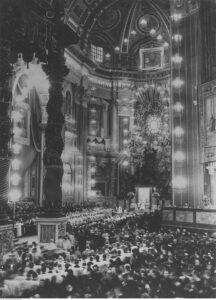
Canonization of Andrew Bobola, Basilica of St. Peter in Rome, April 1938
Poland will be rebuilt
The cult of the martyr grew. Bobola’s body was transferred to Połock and the beatification process began in Rome. In 1819, Andrzej Bobola was to appear again, this time to Alojzy Korzeniewski, a Dominican from Vilnius, announcing a great war, “which will end with peace, Poland will be rebuilt and I will be recognized as its main patron.” Korzeniewski, possessing a strict mind that evaluated the reality around him in a rational manner, did not intend to make his vision public. He told the dream only to his closest confreres. Although he never wrote down any account, several decades later, Bobola’s prophecy was printed in the newspaper Union Franc-Comtoise. It was mentioned in “Przegląd Poznański” and this is how the news of this extraordinary vision found its way to Poland. Bobola was raised to the altars, and his prophecy was forgotten again for decades. Until Poland actually regained its independence.
It is not surprising then that when the Soviet army was coming closer and closer to Warsaw, the Polish bishops turned to Pope Benedict XV with a request – this time for the canonization of the Jesuit-martyr, declaring him the patron saint of Poland. It was believed that with Bobola’s intercession, it would be possible to ask for help for the motherland. The relics of the blessed began to be exhibited in solemn processions in the encircled capital. The Battle of Warsaw took place on the last day of the novena. The well-known events of 15 August 1920 began to be attributed to the intervention of the Mother of God and Bobola.
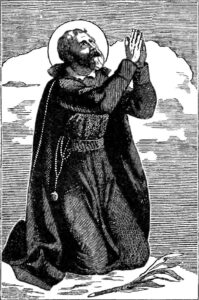
Saint Andrew Bobola
Exhibit of religious fanaticism
The cult of the martyr was especially strong in the border region of Polotsk, and also among the Orthodox. Willing to discredit the “miraculous” story of Bobola, the Bolsheviks intended to make a mockery of the coffin with the remains. At the last minute they were interrupted by an urgent telegram from the Catholic Central Committee and Archbishop Jan Cieplak to Lenin. The desecration of the corpse was stopped. According to the message of Pope Pius XI, Józef Piłsudski, wanting to recover the famous relics, planned a violent raid on Połock. Ultimately, however, he gave up this idea. Nevertheless, the remains of the martyr continued to vex the communists. In 1922, the activists of the Governorate Executive Committee opened the coffin, removed the cap, chasuble and alb from the body and proceeded to test the “cohesiveness of the remains” by throwing them on the floor. “The corpse did not fall apart, it remained in good condition.”
Bobola’s body was taken to Moscow as an exhibit of “religious fanaticism” and placed in the building of the Hygienic Exhibition of the People’s Health Commissariat. The Polish government failed to recover the remains. The Vatican turned out to be more effective as it received the relics in exchange for grain given to starving Russia. As Hansjacob Stehle indicated – on the basis of Russian and Western sources and studies – Lenin himself, after his second cerebral hemorrhage, was “inclined to treat matters of religion more calmly.” The body of the martyr was laid to rest in the Roman Jesuit church of Il Gesú, where it was placed in a glass coffin. It returned to Poland after canonization, in a triumphant train journey with stops in many cities, as reported by the media at that time. In Warsaw, President Ignacy Mościcki laid his Independence Cross on the coffin as a votive offering.
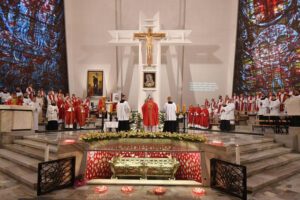
Saint Andrew Bobola Sanctuary in Warsaw. Below you can see the coffin with the relics of the Saint (photo: PAP/B. Zborowski)
Purulent ulcers, pancreas and a miracle
In the “Diary of the canonization and the return of his body to his homeland,” the Jesuit was described as “the hero of the bulwark of Christianity,” “the greatest martyr of the Church,” “the prophet of the resurrection of the homeland,” and “the advocate of a free Poland during the Bolshevik invasion.” The canonization decree describes the miracles that happened through the intercession of Bobola. Among them were, among others, healing a 46-year-old widow. The woman had suffered severe burns, which then “gave birth to foul and purulent ulcers, considered incurable by doctors.” However, after putting a relic of Andrzej Bobola on her body and “summoning him,” the widow “immediately gained enough strength to take care of her sick sister and go to church.” The doctor who immediately examined the woman, as well as the representatives of the Sacred Congregation, concluded that “this healing is beyond the powers of nature.” The second of the healings, according to church documents, took place in Rome in 1933. Alojza Dobrzyńska from the Congregation of the Servants of the Immaculate Virgin Mary suffered from a pancreatic ulcer. The only chance for recovery and further life was a surgery. Before it happened, the nuns began to pray to Andrzej Bobola for healing. And so it happened, on 29 December, “the disease raged in all its strength,” and on the next day it “softened in its malice so much that the experts all agreed that there was a healing.” Andrzej Bobola was declared a saint on 17 April 1938.
Author: Jan Hlebowicz PhD
Translation: Alicja Rose & Jessica Sirotin
polishhistory.pl




